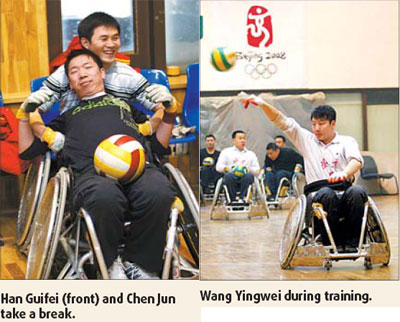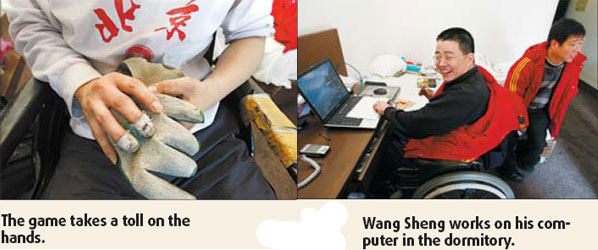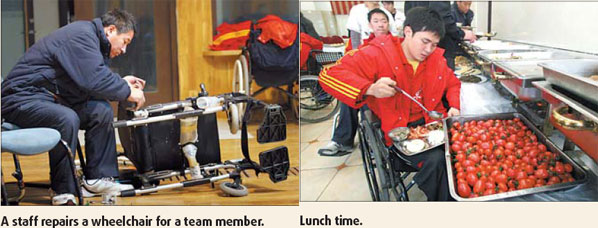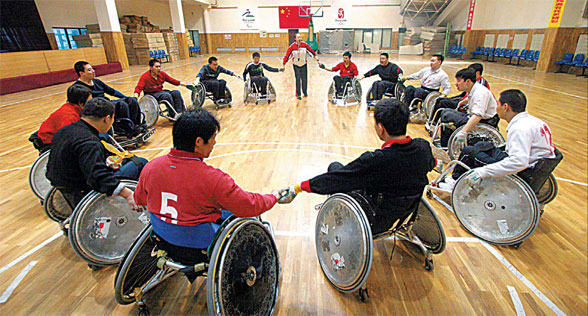Against all odds
|
Routine training starts when team members and the coach gather in a circle, arm-in-arm, and yell "China, come on!" Photos by Ji Liyuan |
Chen Jun opens his sleepy eyes, turns on the light and looks at his watch. It is 6:30 am. "Guys, time to get up!" he yells out to his other two roommates.
The three members of the national wheelchair rugby team prop themselves up on their hands and finally manage to sit up. They then spend the next few minutes putting on diapers.
"We three are the least injured in the team. We can manage these things ourselves without the help of nurses," Chen says. He and his teammates suffer from high paraplegia (HP), a spinal cord injury that involves loss of movement and/or sensation following damage to the nervous system. Many experience dysfunction of the bladder. Some, like Chen, wear diapers to save themselves trips to the bathroom during training.

Breakfast is served at 7:30. Chen has a shelled egg. Sitting next to him is 19-year-old Xiao Shao, the youngest and worst injured team member. He is knocking on the eggshell with his spoon. "Take mine," says Chen and puts his egg on Xiao's plate.
Training starts at 9 at Liaoning province's disabled association. "China, come on!" yell the team members and coaches, arm-in-arm - a common routine before the warm-up and at the end of training.
Led by team leader Chen Shuangmiao, the 14 players wheel their chairs over several laps. Then they fall into five groups and practice ball throwing. "Be quick! Close up, and watch the ball!" instructs Wen Yan, the coach who is in her late 50s.
"Being enrolled in the national team feels like a transformation from being a handicapped man to a professional athlete," Chen says.
In 2002, Chen, then a 17-year-old college student majoring in English, from Hunan province, saw six young men assaulting a girl. He ran up to save the girl. "He was stabbed in the thigh and the neck. You know what? That girl only saw him twice during his rehabilitation," says one of Chen's teammates.
"It has passed. I've accepted the fact that I'm paralyzed. I've never regretted saving the girl," Chen says and smiles. "Except for being handicapped, we are no different from other people."
Chen, Han Guifei and Chen Shuangmiao are among the best on the field.

"Players wheel the chairs mostly using the strength of their shoulders and backs. Their hands can hardly feel anything," Wen Yan says.
Wheelchairs often bump into each other and tip over when players try to stop their opponents and take control of the ball. They support themselves on their arms and slowly get back into their chairs with great effort.
HP patients often endure reduced control of body temperature and inability to perspire. "Nurses have to pour cold water on the athletes in summer to help cool them down. They are easily scalded when taking a shower, which is what I worry about the most," Wen says.

A furry bear hangs on Chen's bag - a gift from his girlfriend. They got to know one another at a rugby game in Yunnan province, and it was love at first sight. The girl accompanied Chen when he went to receive medical treatment in Beijing. She stays with Chen's mother and takes good care of him as he gears up for the upcoming Beijing Paralympic Games.
"She isn't disabled. She is kind and positive. People tell me that I should be content with her love and support no matter what tomorrow brings," says a beaming Chen.
(China Daily 03/28/2008 page18)















